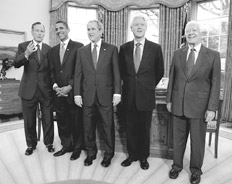Gaza: yet another stage for "preventive warfare?"

There is a disturbing similarity between the present Israeli Invasion of Gaza and the "preventive war" attack of President George Bush against Iraq. The root of this similarity, however, is a fact of "realpolitik:" power somehow always manages to present its causes as just, those of its opponents unjust, immoral or worse. And yet...?
For more than a week Israel has been pounding Palistinians with its super-sophisticated firepower, even with white phosphorous according to the London Times (5-1-09), exploding bombs in refugee camps, homes of suspected Hamas militants, schools and mosques; rough estimates state that 20% of the nearly 700 fatalities are children; journalists have been side-tracked by the invading forces, and the United States has made clear it supports the "preventive" war of its long time Mid-East ally.
True, the Israeli attack is allegedly in response to continued rocket attacks from Gaza that over the past few years have taken the lives of around a dozen Israelis. What nobody dares to mention is that previous to the 1948 war that removed Palestinians from what is now Israel--for the establishment of a Jewish state--both moslems and jews lived alongside each other with considerable tolerance.
Imagine for a moment that the situation were the reverse: that Palestinians had invaded Israel and produced similar numbers of damage and casualties. What would the reaction of the world’s most powerful nations be? As during the U.S. invasion of Iraq, there is a quite disproportionate concern for the death of the invading forces with respect to those defending their territory. Consider also that previous to the attack--as was the case of Iraq--Gaza was and still is subjected to a de facto embargo that has prevented Gaza residents from obtaining medicine, food and basic necesities.
Inspite of president elect Barack Obama’s promise for change, he has only managed to express his "concern" for the situation, using the convenient argument about the existence of "only one president." Nevertheless, his silence sounds increasingly like complicity. It is well known that in foreign affairs the United States always backs Israel, as it also always backs England, and vice-versa. The all smiles meeting between Obama, Bush and former U.S. presidents--who reportedly gave their "advice" to Barack, does not seem to be the antecedent for any abrupt change in U.S. foreign policy, although the president elect has suggested he will stress diplomacy over guns.
Akiva Eldar of the Israeli daily "Ha’aretz" courageously commented on January 6 that “Hamas is an immanent part of the democratic system in Palestine, and the only way to remove it from power is the same way it got there-- through the ballot box. Not with bullets-” Yet the predominant view in the White House, and in Israel appears to be summed up in the biblical phrase: a tooth for a tooth, an eye for an eye."
The unending bush war (pardon the coincidence) between Israel and its Palestinian and Arab neighbors is presented in most of the mass media as a "religious" or "ethnic" struggle between Islamics and persons of Jewish faith. Nevertheless, common sense indicates that--as in the case of most conflicts--the real question has to do with interests.
The Bush Administration had to resort to marketeering and falsification in order to get the approval of the "preventive" invasion of Iraq and oust Saddam Hussein. The argument of preventive war is that a nation is justified in attacking another if in doing so it prevents an action that could result in death and suffering of its own people. Once again, however, that argument is a cover for the real causes of the conflict. It is clear that the action taken against Iraq had to do with oil--Iraq is the world’s number two oil producer--and geopolitics: the attempt to insert a pro-U.S. regime in an area clearly hostile to Washington.
Sadly enough, the process of justifications also included aspects such as the torture of prisoners--subsequently verified in the press and through investigations by civil liberties organizations. Again the question arises: what happens when in the name of "democracy" or "justice" the preventive warriors resort to methods linked to those repudiated and motivating the invasion?
As far as is known there is no oil in Gaza, nor in Israel and neither area is well supplied with land or minerals of great value. Therefore, the logical conclusion is that this war is being carried out 1) to oust Hamas from power in Gaza and 2) to consolidate the geo-political forces friendly to the U.S. and Israel. There is a small problem: Hamas came to power in a popular vote. The other problem has to do with ethics.
Can clearly unjust practices be employed in order to bring about a theoretically more just society? The argument of the Argentine Military Junta on grabbing power in 1976 was to prevent a leftist take-over and save "republican institutions." The result: some 30,000 persons were "disappeared, " laws and the courts were replaced by torture, corruption and mistreatment. The U.S. invaded Vietnam theoretically to save it from falling into the hands of communism. The "counter-insurgency" policies included the use of napalm and chemical defoliants...and in the end it was obliged to accept its defeat. Likewise, in the name of communism or socialism great brutalities were committed in the ex Soviet Union, in the name of the struggle against fascism or Western capitalism.
Is there any way out of this dilemma? We leave that question up to our readers and to the future.
0 comentarios